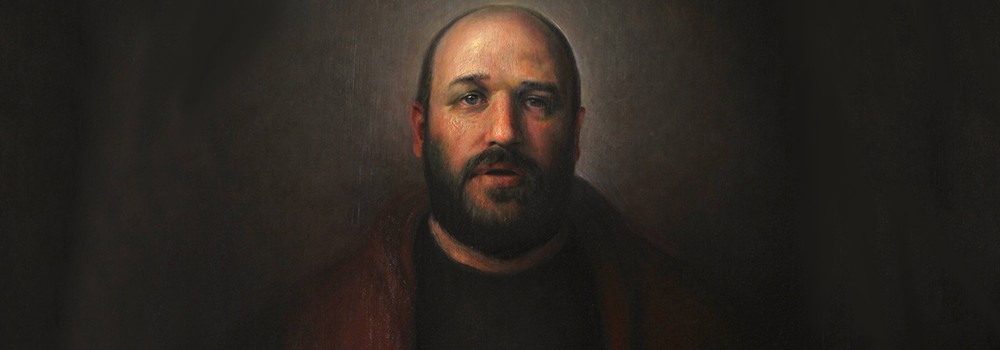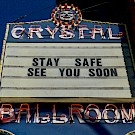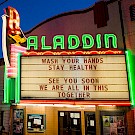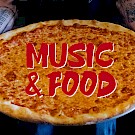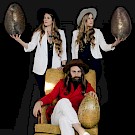David Bazan has been remixing and remastering a lot of different things lately. His music. His workflow. His life. He's been incorporating old songs and sensibilities into new endeavors, like releasing his first music video, embarking on a documentary about his “existential, artistic and family life,” and touring with a very unlikely holiday album collected from annual yuletide song releases, dating back to his Pedro the Lion days.
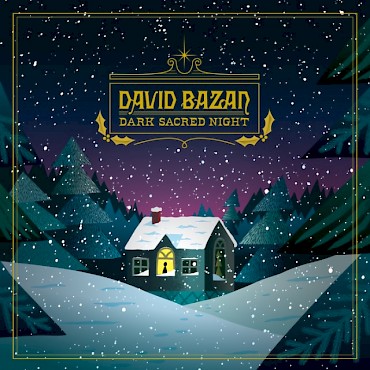 Bazan brings his Christmas Miracle tour to Revolution Hall on December 17 with solemn carols from Dark Sacred Night—10 Christmas songs, the title a nod to a lyric from “What a Wonderful World.” The collection includes meditative classics (“Silent Night,” “Away in a Manger”), somber modern holiday covers (“Happy Xmas (War Is Over),” “Long Way Around the Sea”), and ruminative original bookends to open and close, (“All I Want for Christmas,” “Wish My Kids Were Here”)—listen to an excerpt of the record at the end of this article.
Bazan brings his Christmas Miracle tour to Revolution Hall on December 17 with solemn carols from Dark Sacred Night—10 Christmas songs, the title a nod to a lyric from “What a Wonderful World.” The collection includes meditative classics (“Silent Night,” “Away in a Manger”), somber modern holiday covers (“Happy Xmas (War Is Over),” “Long Way Around the Sea”), and ruminative original bookends to open and close, (“All I Want for Christmas,” “Wish My Kids Were Here”)—listen to an excerpt of the record at the end of this article.
To fill out the set, Bazan will include songs from his third solo album, Blanco, released earlier this year, heralding a sonic departure from acoustic guitar and a return to the synth sounds of his Headphones project. Produced and mixed by Yuuki Matthews (The Shins, Sufjan Stevens, Teardrops), Blanco represents a compilation of the songs released over two years in once-a-month recordings for Bazan Monthly Volumes 1 and 2.
No matter the sound—from guitar strings to symphonics or synthesizer—nor the venue—whether it’s a house show or concert hall—one beautiful consistency remains in Bazan’s music: his raw, emotive vocal delivery of difficult topics, from faith to politics and all the human faults in between. In the spirit of the season, Dark Sacred Night and Blanco are filled with these familiar topics like songs about home, songs that remind us about returning home, about love, isolation and vulnerability—songs that offer an antidote to the “cheery conformity” that Bazan says “is the enemy of ‘peace on earth, goodwill’ to all.”
In the darkest time of the year, perhaps even, in our culture and our larger world, Bazan invites us to “admit your despair to safe people in your life this Christmas. Be a safe person for others. Feel better. Jesus Christ, you guys.” It's an honest Christmas wish we could all find some truth and light in.
The songs on Blanco are comprised of 10 remixed, remastered versions from a collection of 20 songs in the Bazan Monthly installments. Tell me about how you chose them for Blanco, and why the title Blanco—why “white”?
Yuuki [Matthews] and myself, we each made a list separately and compared to see how many songs on our lists we had in common. Most—about 80 percent—were, so it was clear that we were both thinking the same thing—which was capturing one of my favorite moments from the Bazan Monthly, “Both Hands,” which had a different title at the time, and the song “Oblivion.” I wanted to make a record that was stylistically centered around those songs. So much so that there’s a song called “Impermanent Record” from the monthly series. It's one of my favorite songs for the whole thing but tonally, it's just so different. Even if you strip it all the way down to the chords, the melody and the lyrics, the tone of it just doesn't fit with the rest of the songs.
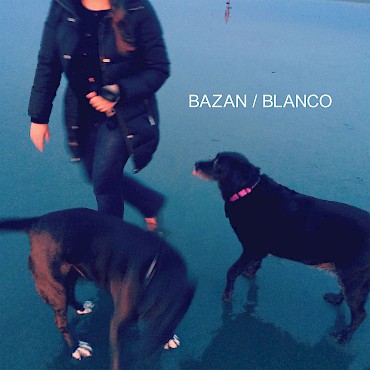 As for Blanco, I know now what it means, and I guess “secret” is too strong a word, but I will say this: I didn't know what it meant initially. Where it originated from was this period of time over the last couple years where I just kept thinking “the white devil, the white devil, white devil” over and over again. I tweeted it a few times where it was just as many lines of writing “the white devil” as I could in 140 characters and sometimes I changed it to “el diablo blanco.” And as I was going through journal lists of potential album titles, band names, or whatever kind of phrases I collect, el diablo blanco was one that I thought, “Oh, I wonder if that would be interesting,” not really having any clue whatsoever what the theme of the record was. I didn't really find that out until I went to write the bio. I had an inkling, but I just let my subconscious do all that stuff, and found out consciously later, if that makes any sense.
As for Blanco, I know now what it means, and I guess “secret” is too strong a word, but I will say this: I didn't know what it meant initially. Where it originated from was this period of time over the last couple years where I just kept thinking “the white devil, the white devil, white devil” over and over again. I tweeted it a few times where it was just as many lines of writing “the white devil” as I could in 140 characters and sometimes I changed it to “el diablo blanco.” And as I was going through journal lists of potential album titles, band names, or whatever kind of phrases I collect, el diablo blanco was one that I thought, “Oh, I wonder if that would be interesting,” not really having any clue whatsoever what the theme of the record was. I didn't really find that out until I went to write the bio. I had an inkling, but I just let my subconscious do all that stuff, and found out consciously later, if that makes any sense.
But El Diablo Blanco I knew wouldn't work after I messed with it for a second, because that's sort of decidedly political. It didn't feel right or look right, nothing was right about it. Then I got hooked on blanco. I thought, “Blanco, Blanco, that seems like it might be the name of this record.” At some point I mentioned to Yuuki that I was thinking about calling the record Blanco and he was like, “Yes! That's what the record’s called!” Not based on what it means, just based on the visceral feeling of this record that we had been working on for a year.
There are other ways that started to creep into other songwriting, that word—so there will be more context in the future to try and solve the mystery. Usually I'm able to start zooming out slowly, get a little bit of distance. I don't even know how one does that—I don't know how I'm actually doing it. It takes time and repetitive listening and space—days between listening, then you come back to it and slowly, you start to hear it from a different perspective, from the less technical, less zoomed-in perspective, that’s when I began to understand what it meant.
You traded a stripped-down acoustic sound for a more electronic one on this record. Can you talk about construction of the soundscapes for these new songs?
The sound that we were apparently going for, though neither of us really work in that way—aiming for something specific—we were just sort of playing until something emerged and then honing it in a way that felt intuitive. What we ended up with is this sound on “Both Hands” and “Oblivion.” There’s something about the electronic-ness, the bedroom-ness, and the strangeness of both of those songs. The emotional aspect to both of them that I feel like is the sound of that moment, of that phase, or that era, and it took 10 songs to get there. “Oblivion” was the first track on Volume 2. Yuuki and I had done six of the 10 songs on Volume 1 together, but I started Bazan Monthly with some old material. I had two songs that were already worked up and recorded to a certain degree. It was after those came out and I was in that next month where I had to come up with tracks three and four. I was in the freefall mode of “I’ve got nothin’, I don’t know what I’m doin’, I don’t have anything to fall back on.” So if you're looking at it, and you're trying to see where the thread begins in terms of the new stuff and the new way of approaching music that led me to “Both Hands” and “Oblivion,” that’s when the construction of this sound really began.
When Yuuki and I made the songs “Nobody’s Perfect” and “Sparkling Water,” which didn't end up on the record, what you see there is acoustic guitar-based song with electronics piled on. So, acoustic guitar with drum machines and sort of sad, lo-fi synthesizers, and it’s us just trying to see, “How do you do this? The thing I have to bring is this song on acoustic guitar, so let's start there and see what happens.” We started piling on electronics, song after song, and pretty soon, a song emerged where there's all electronics and no acoustic guitar, and that’s a song like “Kept Secrets.” Basically, a process to wean myself off of acoustic somehow, but that's what I was secretly wanting to do or not so secretly wanting, who knows.
I would send Yuuki these songs and each time I would send him a song, my side of things would become slightly more sophisticated because my imagination had been expanded by the way that he finished the last track that we worked on together. He has this magic way of adding elements in the mix process—it really feels like he [develops] it into a full version once he gets a hold of it. In a desire to do that, I started using guitar less and less at the root stages of the process, and playing on synthesizers to write the main hook and then build it up from there. It was really this organic process, bouncing back and forth. Through working on 16 different tunes together, we were able to take my songs to a place we were both happy with.
When he sent me “Oblivion” for the first time, I cried, because I thought, “I can’t believe my music sounds like this.” It was also enough me, that it wasn’t like, I sent him an acoustic track and he made this killer electronic song out of it. It was 80 percent what I had sent him of the raw track data, plus his imagination when it comes to mixing.
I started sending him more out-there shit, so by the time I sent him “Over My Eyes,” which is now called “Both Hands,” that was the last thing that we made together, and I think by far the most bizarre, sophisticated and emotionally satisfying in spite of the fact that it doesn’t really function like any other song that I ever wrote—it felt like an evolution.
Any evolution that happens, sonically or songwriting-wise, has to happen organically for me or else I feel like a fraud—it has to be a trusting process between Yuuki and I. “Both Hands” was kind of a crowning achievement for the two of us, and we innately knew that song was the opener. Thematically, I think that it works really well as an introduction to the world of ideas and themes on the record. [Listen below]
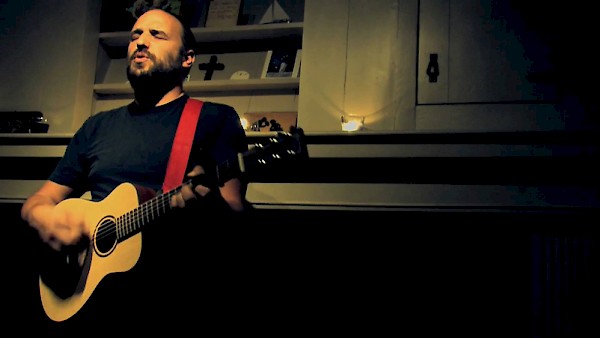 You started out as a drummer. Do you still keep a drum set around or play drums for other projects, or do you strictly use your foot pedals as you do now in your performance setup?
You started out as a drummer. Do you still keep a drum set around or play drums for other projects, or do you strictly use your foot pedals as you do now in your performance setup?
I am still in the process of incorporating that wacky keyboard rig fully. I abandoned it on this tour because it was just not visceral “fun” enough… yet. I can do the things, but it was too technical for me to be able to forget myself, and if I'm doing the job the way that I really want to, then I hit that downbeat and 75 minutes later, I wake up. To where I can lose myself in the crowd and the sound, and I was having a hard time doing that.
One of the reasons I even attempted that kind of monkey business that I was doing on the foot pedals and will continue to do, is because I was a drummer at first and I am a drummer, and as a drummer, one of my strengths was limb independence. It's something that drummers practice a lot, especially people doing jazz, the ability to have your limbs basically improvise independently against one another. I'm not a jazz drummer, but in the sort of mathy, indie drum writing and things that I was interested in, limb independence came into it, so I practiced and have those skills online ready to go, so I do play drums as much as possible.
There’s been a conundrum at the root of my professional art or working life that I've literally just solved within the last five days. All the threads that I had abandoned for some dumb reason… I played drums constantly and I've been gravitating toward that again for the last year. I sit and play finger drums, MPC-style drums, and foot drums. I just love drums so much and there are a hundred ways to do them. I just find sounds that I like, and it's a really cathartic thing to load up a bunch of pads with killer, heavy sounds, turn up the speakers and just pound. I found something that anybody can do for very little money and it’s so enjoyable. So yeah, I still really love that and it’s renewed the way I think about songwriting.
I love the softly climbing and falling melody and harmonies on “Kept Secrets” and the lullaby of self-love on “Trouble With Boys.” They’re like stories from two sides of the same crappy relationship coin. Which makes me think, the songs on Blanco are very personal but perhaps not strictly biographical. How do you go about exploring the sort of characters’ lives and emotions in your lyrics on songs like these?
One of the things that changed while doing the monthly thing—as part of some of the little positive changes that continue to cascade into my workflow—was that because of the deadlines, I didn’t have enough time to write lyrics. I had 10 percent the amount of time that I usually take to write lyrics and so I had to write really fast. I was having to fly blind, in a way, so before I even knew what anything meant at the time, or necessarily what was happening, I just had to be finished with it. Because of that, I had no idea what I was saying; I had to go with my gut and I had no plan. I didn’t know what I was exploring. I didn’t know what “Both Hands” was about. Now, the songs and the themes on the record are very clear to me. I was thinking “finish the lyrics so you’re going to be happy singing them and you’re not going to feel embarrassed.” It’s better for something to be a little obtuse than for it to be sentimental or ham-fisted. “Trouble With Boys” came up pretty quick and I didn’t think I would do anything with it. I hadn’t gotten to the “you are worthy of love” part when I was writing it, I just had a couple of verses and it moved me greatly but it felt so different—so vulnerable, sort of inappropriate. But then the monthly model saved the day again where we got to the end of Volume 1 and I didn’t have the other tunes but I knew that that song made me feel something so I kind of chastised myself: “You fucking asshole. If you feel something, then you put it out. What’s the matter with you?” And so I did.
I think I’m trying to understand the most important relationships in my life without having a ton of relationship experience. I feel like I've been trying to understand adultery this whole time. Even in Pedro the Lion. And not my place in it, but more what is it and where did it come from? It's just such an intrusive thing that runs counterintuitive to what most people are trying to do with their lives—it interrupts things. That word is funny too, the big A. I'm interested in our capacity to betray one another. I've been wondering about it.
I think that “Kept Secrets” is me continuing to do that. The chorus came first, but I didn't know what my subconscious was getting at—there was this feeling—a weird songwriting scheme. Initially, it was just around the idea of glaciers. I guess I'm using the environment as a metaphor of sorts and the environment that we’re all sort of aware of now. The melt to change everything.
I started to realize that I was messing around with the metaphor for lying that I thought was compelling and it seemed rich, so I kept on mining it. You pick up little anecdotes, little whispers and ideas based on somebody’s actions in a relationship, and the rest of it gets filled in that way. There’s some fun turns of phrases that I have a good time singing every night. In the second verse, to annunciate “you pen the doctrine of preemptive war,” in the “Happy Birthday, Mr. President” way. It’s just so funny. It entertains me, which is why all that stuff gets in there too.
There’s this judgmental kind of voice in me. Strange Negotiations [Bazan's previous solo record] was a real big expression of that voice. Finding fault with people’s behaviors. Big societal shit. Norms and that kind of stuff.
“Trouble with Boys” is the other side of the coin. There’s nothing political about it. It’s truth-telling in a similar way. It’s illuminating something. Hopefully, I’m inviting the character in “Kept Secrets” as well. There’s a vulnerability in talking about one’s hope. Without even realizing it or knowing it, subverting our hopes for how things might turn out or what the world could be like because you need some other thing in the short term. It is an invitation to that. To self-love even—to admit that “you are worthy of love,” and you should seek out people who treat you like that. I think that’s what the whole record is about.
In a recent KEXP performance you humorously remarked that you were “Coming up on 19 years without a job,” and I thought about lyrics to your song “Oblivion.” Where is the sustainability and balance for you between home and family and touring in the music life?
Since 2014, I realized that I need to change the way that I do things and it’s kept me away from home too long every year, so I’ve been working towards that for the last two full years. It just occured to me earlier in this tour that it’s time to make a commitment to an amount of days that I’m trying work with. The balance is something that I hope I’m going to find next year.
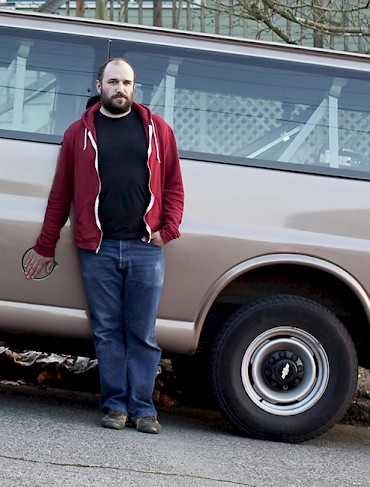 Where I’m currently residing is like 10 percent too much all the time, and it has been for a really long time. That’s not a big number, but it feels pretty toxic at times. It feels like a subtle adjustment, but a big part of that is, I’ve had a really difficult time understanding how the workflow of what I do should function in terms of personnel and other people. What part of the workload I take on and how the division of labor works between people who are playing with me. Because of a combination of traits of mine, all positive things, but when they’re combined made for really confusing times in the '90s and the 2000s in independent rock bands. Basically the long and the short of it is, I have avoided committing to being a solo guy—occupying all this space, doing all of the work in this job that I should’ve been doing for a long time because I thought it isolated me from other people. And I have this desperate desire to be on a team and to be included.
Where I’m currently residing is like 10 percent too much all the time, and it has been for a really long time. That’s not a big number, but it feels pretty toxic at times. It feels like a subtle adjustment, but a big part of that is, I’ve had a really difficult time understanding how the workflow of what I do should function in terms of personnel and other people. What part of the workload I take on and how the division of labor works between people who are playing with me. Because of a combination of traits of mine, all positive things, but when they’re combined made for really confusing times in the '90s and the 2000s in independent rock bands. Basically the long and the short of it is, I have avoided committing to being a solo guy—occupying all this space, doing all of the work in this job that I should’ve been doing for a long time because I thought it isolated me from other people. And I have this desperate desire to be on a team and to be included.
It really wasn’t until this tour, when Blanco came out, that I started trying to shore up the solo thing so that I could basically stay home more and not pay $1,000 a day to have a band that wasn’t probably ever going to stick around for very long anyway. While on this tour, where every night people ask, “So, you playing with the band?” I was really self-conscious about that, but I’ve slowly worked it out, day by day, and I have this hope that by the end of the tour, by the end of the year, I’ll know what I’m doing and how, in fact, this new balance is going to work.
At this point, I don’t think gatekeepers of any kind can stop me from doing what I want to do. A bad review is a different place than where I am. My access to people that listen to my music isn’t through any of those outlets, and those outlets have ignored me the whole time and here I am. It just feels good. It’s a funny question and a great one and I am smack dab in the moment where I’ve been dying to solve that conundrum and I think I just did. It should start looking like the life that I want to have.
What comes next for you? A similar forced-release writing process of new music or new explorations?
One of the things that we came up with in that plan for balance is that forced deadline is really effective for me and I’d really like to have that be a part of what happens. Albums still seem to be the format that you can really get people’s attention with these days. It’s counterintuitive since the record’s been dead for 20 years, we’ve been hearing, but you can’t get people to pay attention to shit unless you spend the 20 grand to hire a publicist and do radio and all that stuff. The record is still the way, so I’ve decided I want to put out a record every year on my birthday, for… I don’t know. I feel like if I do it for less than 10 years in a row I’ll be a little disappointed. Maybe there’ll be an EP in there every now and again. That’s the deadline and this time, this first January 22 we’re going to do an EP. So I have that structure in place for releases.
With this transition, a lot of things have been opening up for me. I was in my hometown [Phoenix] and something about that place just overwhelmed me in a way. I realized that I had a lump in my throat for 20 years without realizing it. Whenever I’m there, I have this longing, and it’s all a bunch of unresolved shit that I never spent time thinking about. It just occurred to me that’s the next thing that I’m going to be doing. Just go down there and spend some time [there] every season and write a bunch and at the end of it, that’s probably where the record’s going to come from.
Working out those old stories?
Yeah, those old stories, those old places. With a framework like that, it’s so personal, and there’s an endless amount of things to write about. It’s a question of “What do you choose, what rings the bell right now for that place?” after I immerse myself in it. One of my good friends and his photo partner took the Strange Negotiations photographs. He and I are going to go down there together. We grew up in Phoenix together and we’re just going to kind of haunt that place for a little while to see what we find photographically, musically, sonically and lyrically. See if there’s a way that we can honor that place. And if that works, there’s four or five other towns that I lived in before I settled in Seattle. We might be on a road trip for the next five or six years in a way that could be really cool. We’ll see!

